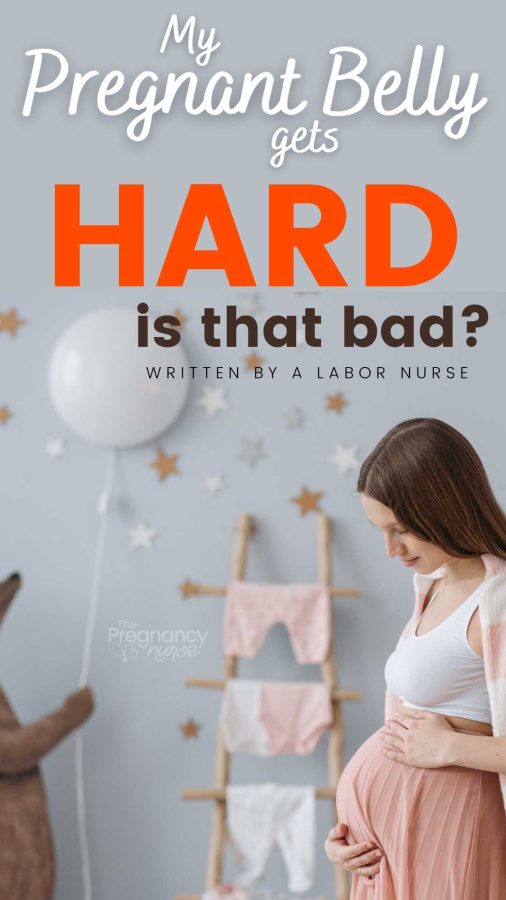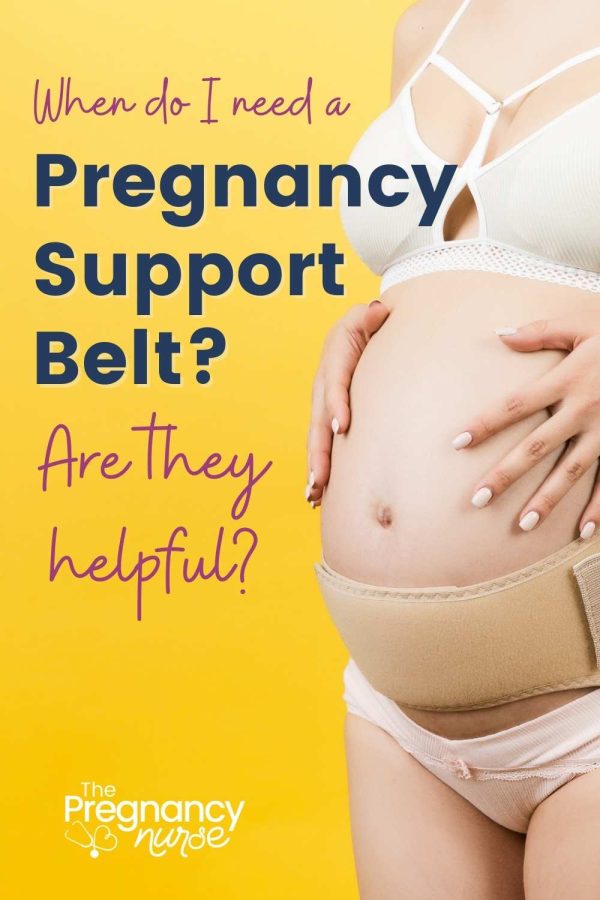If you’re pregnant and feeling a hard stomach (or some people call it a tight stomach), you may be wondering if something is wrong. In most cases, a hard belly in the third trimester is normal and is caused by your baby’s position or your body’s changing shape. Often you’ll find that it softens if you lay down. BUT, there are some situations where a hard stomach can be a sign of a problem. So let’s talk about the difference.

Is it OK To Have a Hard Belly in the Third Trimester?
First off, always report any new issues to your provider, so they can assess you and your circumstances. However, often your belly will feel hard all the time as you stand in your third trimester.
Most likely those are your abdominal muscles stretched across your uterus rather than the uterus itself. If you were to lay down and pull your knees up hopefully those muscles soften a bit and it feels soft again.
However, if your belly is hard with other sensations like cramping, bleeding or pain that is long-lasting that could show an issue and you’d want to get in contact with your provider asap.
In my experience the majority of my third trimester my belly felt hard when I was standing, and I find that to be true with my patients as well. I can’t really assess any contractions if they are standing up, so laying down is best way to asses what your uterus is doing in there.
Again, if you’re finding a constant hard stomach at 38 weeks pregnant — I’d talk with your provider, I think?
Want to know more about weird third trimester stuff — check out these posts:
- 3 Things to Do At the End of Pregnancy for a Faster Labor
- The WORST Parts of Pregnancy
- Self Care During Postpartum & Pregnancy
- 5 Fixes for Groin Pain During Pregnancy
- 40 weeks + a day and No Sign of Labor?
What Can Cause a Hard Stomach During Pregnancy?
Before we get started, just a reminder that if you find ANYTHING that alarms you about you pregnancy you should totally talk to your provider about it, this article is here just to provide some brief info on why it might happen. Informational only, not medical advice.
Baby’s Growth (and subsequence uterus growth)
In the third trimester, your baby grows rapidly and begins to move into a head-down position in preparation for birth. As your baby drops lower in your abdomen, you may notice that your belly feels harder. This is because your baby is taking up more space and pushing against your abdominal muscles. You may also feel an occasional sharp pain as your baby kicks or stretches.
Your body shape is also changing during pregnancy, which can contribute to a feeling of fullness or heaviness in your abdomen. As your uterus expands, you have some pregnancy weight gain and your stomach muscles stretch, you may notice that your belly feels hard at times.
This is normal on your first baby or even other babies as well.
Pro Tip: As baby moves and grows your stomach may even feel different day to day. It’s crazy to think you’re growing a human inside of you, right?
Everyone’s belly does their own thing based on so many factors during pregnancy, I do also have a whole post on when your belly will start to get hard during pregnancy.
And yes, this seems complicated — but don’t worry — I’m here to simplify it, just like labor and delivery << for you AND your partner!
Other weird pregnancy things:
- Charlie Horses in Pregnancy: What you can do to prevent them?
- Normal Daily Fetal Movement – Kick Counts
- What to Do If You are in Pain During Pregnancy
- Prodromal Labor: What is it and how to avoid it?
- Avoid Tearing at Delivery: 3 things you can do.
Contractions
Contractions can also make your belly feel hard. Often a pregnant woman will wonder what the tightening sensation is.
Early contractions are often not painful — more like just contracting your bicep or glutes (so it can be confusing as they expect all contractions to be painful).
People are always surprised when they see contractions on the monitor but they’re not feeling them.
No matter if they are Braxton Hicks contractions or “real contractions” it is still making your uterus contract (and just like when you contract any of your muscles it gets hard).
You may feel these contractions of the uterine muscles just in your lower abdomen, or your back (usually lower back), period cramps, or full abdominal pain — all aren’t unusual. Some women also describe them as a change in how they’re breathing as it can push baby into their lungs a bit too.
Most women say that the beginning of labor feels like mild menstrual cramps that extend into more pains.
However, if they are frequent you may be having labor (or preterm labor if you are before 36 weeks). If you’re still in your early pregnancy it’s a good idea to ask your provider at your prenatal visits how many contractions are OK to have before you call them. As you get further into your third trimester of pregnancy (past 36 weeks of pregnancy) these are normal contractions getting your uterus ready for labor.
Contractions come and go — most often you’re not in constant pain with a contraction. So, you’ll have a contraction and then a few minutes will go by, and you’ll feel another one. This is true of real labor and false contractions.
What are Braxton-hicks contractions? Mostly it is just your uterus contracting, often due to growth. But it can be due to fetal movement, your movement or any number of things. They are really normal, but the biggest indicator that it is just Braxton Hicks is that it doesn’t turn into full blown labor where contractions come at regular intervals, get closer together and more painful with time. If the contractions don’t do that it’s normally just a “false alarm” and you just need to keep an eye on it.
Remember true labor contractions are when they are making your cervix open and actively dilate. False labor contractions can still hurt, but aren’t causing your cervix to change or dilate.
Because your muscles and ligaments get tired of holding that baby up, you might find a support belt helpful!
Other Things It Could Be:
Constipation — if you really are constipated, it can make your stomach feel more bloated and “hard” (this can be especially true in the first trimester, and second trimester before your uterus starts to take over the whole area.
Be mindful of any dehydration because of this — make sure you’re staying properly hydrated and eating enough fiber as well.
Why is my pregnant belly sometimes hard and sometimes soft?
It could be contractions (especially if you’re heading towards your due date, they are more common then) — it can also be baby’s position, or just your how your abdominal muscles are spread over your expanding uterus.
Great question for your provider if you want to know more about you and your body!
My Stomach Hurts….
If your stomach HURTS it can also be from a few reasons:
Growth of your uterus is obviously causing muscles and organs to shift around as you get closer to the end of your pregnancy.
Often, pregnant women experience round ligament pain. The round ligaments are the ligaments that help attach your uterus to your body. As they stretch and grow it can be painful. In general these tend to be sharper longer-lasting pains vs a contraction. Often women experience this pain when they cough or sneeze, or when they stand-up or twist their body in an awkward way.
If it’s near your belly button it could also possibly be a hernia. Sometimes, as those stomach muscles expand with your growing uterus it can cause a gap where a hernia could happen. The good news is that most often this goes back to normal after pregnancy, and no intervention is needed. However if you’re having severe pain around your belly button you’d want to contact your healthcare provider as they can sometimes be an issue that needs help. I have a whole post on belly button pain that might be helpful if you think that could be a cause.
Baby’s Movements can also hurt. As baby’s position changes you can have some pain as things shift and move in that area. Often that’s ligament pain but it could also be gastrointestinal tract adjusting to where the baby wants to be right now.
It could also be a bladder infection. If you are having any burning with urination, or frequent urination (more than before, I know this one can be confusing) it COULD be a bladder infection. These happen often during pregnancy and aren’t unusual with hormonal changes. Ask your provider if you can leave a urine sample to see if that’s the issue. My sister site has a good post on bladder infections.
Pro Tip: With all these changes in your body it can be easy to forget about baby’s movements. Make sure you’re still doing your kick counts during this time! The best way to do these is outlined in my podcast.
And, grab my cheat sheet if you’re not sure how to use them:
How do I know if my hard stomach is labor?
Normally if it is just a hard stomach without pain or any other symptoms it is likely just your growing uterus.
However, if you are staring to feel the pain along with some of these other following symptoms of labor you could consider that you’re going into real labor:
- Loss of your mucus plug
- Changes in your vaginal discharge
- You have back pain as well as abdominal pain
- Nausea/Vomiting or Diarrhea
Again, these signs of labor aren’t something we want to see until you’re in the home stretch of pregnancy — full term. If they’re happening before 36 weeks, call your provider. Most often they have someone on for them 24/7 to answer important questions like these.
BTW, if you’re seeing signs of labor, it’s time to pack your hospital bag!
When Is a Hard Stomach During Pregnancy a Problem?
In most cases, a hard belly during pregnancy is nothing to worry about. However, there are some situations where it can be a sign of a problem. For example, if you suddenly develop severe pain in your abdomen or feel faint or dizzy, this could be a sign of placental abruption, which is when the placenta starts to separate from the uterine wall before delivery.
Placental abruption can be dangerous for both mother and baby, so it’s important to call your doctor right away if you experience any of these symptoms.
Other warning signs that warrant a call to the doctor include
- Vaginal bleeding;
- Contractions (as I’ve said, be sure to know how many contractions are OK for you)
- Severe headaches
- Visual changes such as blurred vision or light sensitivity
- Excessive swelling in the hands, feet or face (especially if it sudden)
- Decreased movement from baby
- Difficulty breathing
- Persistent nausea or vomiting.
- Leaking of amniotic fluid (or if your water breaks)
If you experience any of these symptoms, call your OB / Gynecologist right away or go to the nearest emergency room.
It can be really confusing. A lot of pregnancy makes your whole WORLD seem different (and you can be afraid something is wrong a lot).
I don’t want that for you, and I think there’s something you can do to feel more prepared. The Online Prenatal Class for Couples is truly the easy way to get prepared for birth. Come join me to get prepared!

And, if you’re not quite sure you’re ready for that whole thing, check out my free prenatal class. It’s your first step toward becoming your own birth boss.
Don’t miss my super helpful post all about the signs of labor. Great info for pregnancy!









 Your Gurgling Stomach During Pregnancy: Your second trimester soundtrack
Your Gurgling Stomach During Pregnancy: Your second trimester soundtrack
